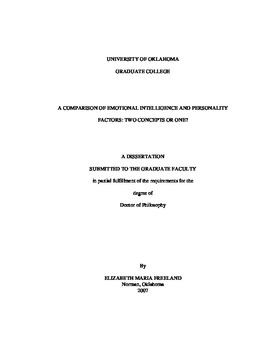| dc.contributor.advisor | Rodgers, Joseph L., | en_US |
| dc.contributor.advisor | Terry, Robert A., | en_US |
| dc.contributor.author | Freeland, Elizabeth Maria. | en_US |
| dc.date.accessioned | 2013-08-16T12:20:36Z | |
| dc.date.available | 2013-08-16T12:20:36Z | |
| dc.date.issued | 2007 | en_US |
| dc.identifier.uri | https://hdl.handle.net/11244/1166 | |
| dc.description.abstract | Emotional intelligence (EI) has become an active topic among researchers (e.g., Ciarrochi, Chan, Caputi & Roberts, 2001). Such attention has increased awareness of EI but also fueled controversy. Much of the conflict has focused on the multiple definitions of EI. This dilemma introduces issues of convergent validity and questions about discriminant validity between EI and similar constructs such as personality. The purpose of this study was to explore some of these controversial issues. Data were obtained over two semesters, primarily from undergraduate students taking a testing course at the University of Oklahoma, with additional subjects collected from University of Oklahoma graduate students in Europe. These students provided responses on three instruments: the MSCEIT, EQ-i, and 16PF. Eighty-nine students participated, from whom a small amount of demographic information was also obtained. Discriminant validity between EI and personality factors was examined by comparing results from the two EI questionnaires with the personality inventory. Convergent validity of the two EI measures was also assessed, and gender differences were explored. Finally, the predictability of EI based on personality was examined. The MSCEIT was found to measure components of EI separate from personality, whereas the EQ-i was determined to measure EI competencies that are related to and influenced by personality. The MSCEIT and EQ-i were also found to measure entirely different concepts from each other, and no gender differences were detected. Finally, certain personality factors were suggested as having a predictive relationship with EI competency. Implications of these findings, difficulty with questionnaire accessibility and scoring, and suggestions for future research are discussed. | en_US |
| dc.format.extent | xvii, 92 leaves ; | en_US |
| dc.subject | Emotional intelligence. | en_US |
| dc.subject | Psychology, Cognitive. | en_US |
| dc.subject | Personality and emotions. | en_US |
| dc.subject | Psychology, Psychometrics. | en_US |
| dc.subject | Personality. | en_US |
| dc.subject | Psychology, Personality. | en_US |
| dc.title | A comparison of emotional intelligence and personality factors: Two concepts or one? | en_US |
| dc.type | Thesis | en_US |
| dc.thesis.degree | Ph.D. | en_US |
| dc.thesis.degreeDiscipline | Department of Psychology | en_US |
| dc.note | Advisers: Robert A. Terry; Joseph L. Rodgers. | en_US |
| dc.note | Source: Dissertation Abstracts International, Volume: 68-03, Section: B, page: 1973. | en_US |
| ou.identifier | (UMI)AAI3257385 | en_US |
| ou.group | College of Arts and Sciences::Department of Psychology | |
